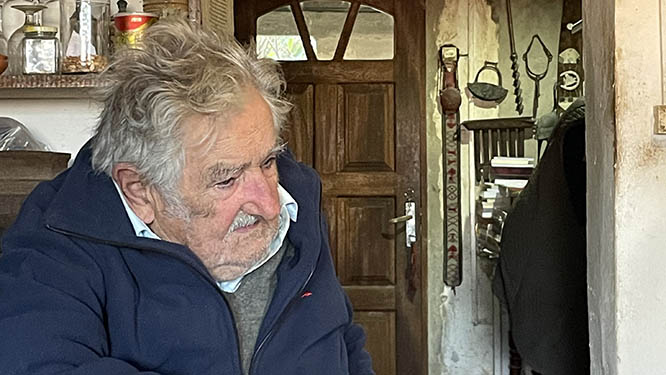Pepe Mujica, 1935–2025
Pepe Mujica, 1935–2025
The late Uruguayan president had an unmatched connection with popular sectors and the courage of his enduring convictions.

José “Pepe” Mujica died on Tuesday, May 13 at age eighty-nine. Mujica was an icon of the democratic left in Latin America and around the world. In the mid-1960s, he joined Uruguay’s Tupamaros—a guerrilla organization known initially for spectacular Robin Hood–style robberies. As violence with authorities escalated, Mujica was shot six times, captured four, and escaped prison twice. He spent all of the years of Uruguay’s military dictatorship—from 1973 to 1985—in prison, much of it in solitary confinement.
After the restoration of democracy in 1985, Mujica and other Tupamaros were released. He then helped form the Movement of Popular Participation (MPP), which became (and remains) the largest party in Uruguay’s left-wing coalition, the Frente Amplio. Mujica served as Uruguay’s president from 2010 to 2015. While in office, he decided to live on his small farm outside of Montevideo rather than using the presidential residence. He donated 90 percent of his salary to charity. After his presidency, he remained an advocate of Latin American integration and an international symbol of the democratic left. We are republishing this short remembrance by Uruguay’s leading historian, Gerardo Caetano, which first appeared in Spanish in El País.
—Patrick Iber
As has been said so many times about different Latin American leaders, José Mujica lived as if he were immortal. And we all somehow came to believe it. His attachment to life was so strong in his final years, sustained by his daily communion with nature through work on his farm, that the feeling of absence those of us who truly knew him have today is natural. Today we are missing someone, and we feel it in our bones.
As a political figure, Mujica left no one indifferent. If reactions to him ranged from resentment—sometimes hatred—to deification, even those who were his enemies cannot but be moved by his passing. As expected, he did not, and does not, generate unanimous or unchallenged mass support. Regarding his governing abilities, it has always been known that Mujica did not like being a commander, nor even a manager. These were not his strong suits. He struggled to control his emotions, hated political calculation, and his verbosity often made him forget that wise saying that a ruler also governs when he speaks. However, he was also very pragmatic, knew how to negotiate, and “had a reverse gear,” as he often reiterated.
With an unmatched connection to popular sectors and the courage of his enduring convictions, he championed proposals that he initially didn’t share, or hadn’t even been a part of his political vocabulary. The agenda of new rights (marijuana regulation, abortion decriminalization, marriage equality, etc.) that were advanced during his presidency is often incorrectly attributed to intellectual and ideological leadership by those outside Uruguay. His main conviction had to do with the ultimate wisdom of common people and the pressing need for collective efforts built by many hands over many years. He often explained his conception of government this way: “To govern is to create the conditions that make governing possible.” Did he do that?
In certain core aspects, yes. He maintained an open dialogue with businesspeople and workers alike. In spite of ups and down, he had a good relationship with his opponents. He achieved broad popular support for bold measures like the direct fight against drug trafficking and the continuation and deepening of inclusive social policies. He broke with many shibboleths of the more dogmatic left. With his peculiar charisma, he became a symbol of an alternative vision on development and consumerism globally. He hated protocol and loved to expose the undemocratic solemnities that surround presidents (and that can be confused with the strength of institutions).
By living in alignment with what he said and what he did, he revitalized the legitimacy of politics, not only in Uruguay but also internationally. He thoroughly proved that it’s healthy for a president to live like most of his people and not to believe himself an “elected monarch.” He knew how to personify a republican vision that combined realism with simple but deep proposals, as in his condemnation of consumerism or his defense of a more sensible use of freedom and time. With his unusual history and inimitable style, he proved one of the most demanding maxims that Uruguay likes to claim as part of its national culture: “Nadie es más que nadie”: “No one is more than anyone else.”
Mujica had the conviction to remain himself, in failure or success, in totally different circumstances and settings, from long talks at his farm or from the dais of the United Nations. His personal approval ratings have always been higher than his approval ratings as president. Perhaps therein lies the key to his legacy: that of a politician with strengths and weaknesses who knew how to prioritize his connection with common people, living like them by free choice, not by religious or ideological imposition, without pretense. He knew very well he lived a difficult life. He was a child of his history and stubbornly didn’t erase his tracks, though many memories weighed too heavily on him. I believe Uruguay will lose much with his death. But he always said his main desire was for young people to take up the torch and not stop fighting for solidarity. He knew they would do so for causes different from his own, and he hoped they would do so without making his mistakes. But he wanted them to be united by commitment to others, with the firm conviction that “no one is left behind.” Of course there is a future without Mujica. It is what he always fought for.
Gerardo Caetano is an Uruguayan historian and the author of José Mujica. Otros mundos posibles (Planeta).






